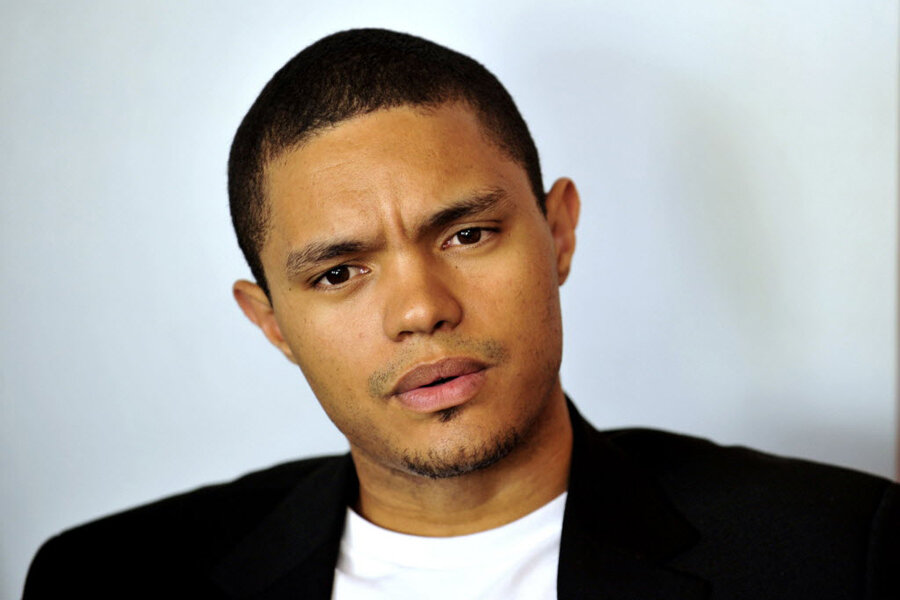Is Trevor Noah just what 'The Daily Show' needs?
Loading...
| Los Angeles
Trevor Noah knows how to mine the hurt of discrimination for a joke.
In an appearance at the Apollo Theater in London, he described growing up in a mixed-race family under South African apartheid. He spoke of walking down the street holding his mother’s hand – and her dropping it when police were around because any interaction between whites and blacks was illegal.
“I felt like a bag of weed,” he joked.
American audiences were caught off-guard Monday, when Comedy Central announced Mr. Noah to succeed Jon Stewart as host of the satirical news program “The Daily Show.” But many observers concerned with the often-stilted conversation around race taking place in the United States see Noah a welcome shift.
“It is one thing to have a white Jewish-American comedian [like Mr. Stewart] talk about black racism and race-related issues that arise in the news ... to joke about it in ways that highlight the absurdity of racism,” says Gordon Coonfield, a communications professor at Villanova University, near Philadelphia. “But it is quite another thing when the person telling the jokes and critiquing the news shares those experiences and that culture.”
Noah may not be a product of American culture, but he is no stranger to the kind of racism that black Americans deal with on a daily basis.
In fact, he may be in a unique position to bring a fresh perspective on race relations, “precisely because he’s not African-American, but South African,” says Los Angeles-based civil rights activist Earl Ofari Hutchinson, who has written a dozen books on race relations. "Noah's stint at Comedy Central is living proof that the world is becoming truly a diverse, global platform where views, perspectives, and outlooks on issues and problems can merge as one."
His remarks during his first of three appearances as a contributor on “The Daily Show” offered a hint of how Noah's global perspective can play with race issues in the United States – with skewering humor.
“I never thought I’d be more afraid of police in America than in South Africa,” he told Stewart. “It kind of makes me a little nostalgic for the old days, back home.”
He told David Letterman that he did not like being introduced as a comedian from Africa, as if he represented the entire continent. "They make it sound like a guy in a leopard skin's going to come running on the stage," he said.
Black activists interviewed applauded Comedy Central’s selection of black hosts to fill two of the network’s most-watched time slots. (Black comedian and "Daily Show" alum Larry Wilmore hosts “The Nightly Show,” which replaced Stephen Colbert’s “The Colbert Report.” Much of Mr. Wilmore’s program centers around discussions of race.)
“The cable networks are doing a much better job with diversity than Hollywood currently is,” says Najee Ali, executive director and founder of Project Islamic H.O.P.E. in Los Angeles. “It’s important that [Noah’s] voice be added and listened to by the late night audience who are looking for someone who is younger, a hipster who is racially unbiased in his comedy with an experienced worldview."
Other critics see the selection of another male to host a late-night show, regardless of his race, as a missed opportunity to bring a woman to the late-night lineup.
For its part, Comedy Central says that both men and women were given the opportunity to audition for the position.
“We talked to women. We talked to men. We found in Trevor the best person for the job,” Michele Ganeless, president of Comedy Central, told The New York Times.
Media scholars are optimistic that Noah can both carry forward the vision for the show shaped by Stewart’s guiding hand while bringing his own fresh insight.
“He has all the potential to transform all the usual fare that Jon Stewart has mined wonderfully for 16 years while going beyond it in a way that he is not compared to Stewart, who is irreplaceable,” says Robert Thompson, founder of the Bleier Center or Television and Popular Culture at Syracuse University in New York.
And Noah’s obscure status in the United States gives him ample room to come into his own on the show organically, says Paul Levinson, author of “New New Media” and communications professor at Fordham University in New York.
“Trevor Noah is a great choice to succeed Jon Stewart – he’s even less known than Stewart when he first took over 'The Daily Show,' which will allow Noah to really start with a fresh slate,” Professor Levinson says. “He’s funny, satirical, and his political and social parries are sharp and smooth, like a deft swordsman.”







